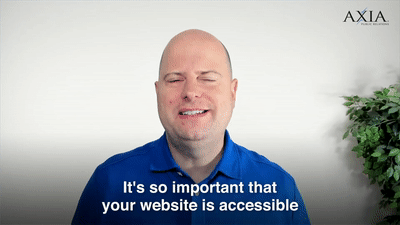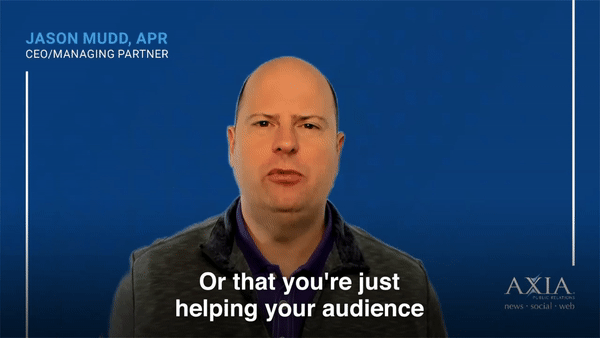The Public Relations Blog
We frequently blog about the latest public relations corporation communications, and marketing topics, tips, and trends. Our blog is one of the 100 Best Public Relations Blogs, according to FeedSpot. Please help yourself to our insights and be sure to subscribe to our weekly blog notifications.
Many people think search engine optimization (SEO) is easy, but they forget the basics of optimizing a website. SEO is simple, but there are some ground rules you must follow to rank on top.
According to sources, 57% of web traffic comes from Google, so optimizing your website page description is definitely worth it. Knowing the basics of SEO for website page descriptions can help you succeed if you have a limited understanding of the subject.
Read More
Topics: online public relations, owned media, web media
How keyword stuffing can affect your brand online.
Keywords have always been one of the most prized possessions when it comes to the online space. Designed to make your content more search engine friendly, keywords can boost your search engine rankings and get your brand discovered.
Just as anything in excess is bad, including too many keywords in your content can do more harm than good to your company. Stuffing your web page with the same long-tail phrases tends to kill your search engine optimization (SEO) efforts and degrade your online visibility.
Read More
Topics: owned media, web media
Are you using keywords, or are you stuffing keywords in your content? Learn the difference with Axia experts.
A lot of top-ranked web pages have keywords stuffed egregiously throughout the content. However, when your content isn't credible enough to entice the end user, there's no point in getting ranked on SERPs (Search Engine Ranking Pages). While we need to use important keywords in website titles and meta descriptions in order to attract traffic, no one’s ever explained the fine line between using keywords wisely, and keyword-stuffing.
Read More
Topics: online public relations, owned media, web media
With a plethora of SEO tools available on the market, it may feel overwhelming to choose between the many free and premium options out there.
While premium SEO tools offer advanced functionality, on-call support, and more, the free ones often do the trick of solving the most urgent optimization issues. To make your life easier, we’ve curated a quick list of free SEO tools that can help you, from beginner to advanced SEO optimization levels.
Read More
Topics: online public relations, owned media, web media
Nowadays, having a website can be considered a necessity if you want to market yourself or your business online. Having a company website means that you have more opportunities to present yourself to a broader audience.
Using your company website as a public relations (PR) tool can also help your business build credibility and attract more customers. But how can you make your company website into a reliable public relations tool?
In this article, we will take a look at the importance of using a website for PR and some impactful website elements to strengthen your PR strategy.
Read More
Topics: web design & development, owned media, web media
Website managers should take advantage of the many hosts that install WordPress automatically.
There are many ways to increase your website’s visibility. One way is to have a blog integrated into the website that gives informative content related to your industry and your site visitors.
The problem is that adding a blog to a website can be a bit of work. If you’ve selected WordPress for your blog, it’s easy to set up a blog and add it to your website.
Read More
Topics: web design & development, owned media, web media
A website that’s accessible to those with disabilities will get more customers
Ever since the Americans with Disabilities Act (ADA) was passed in 1990, those with disabilities have been able to go places they were previously unable to, opening up many opportunities. While the main focus on ADA has been on physical locations, it’s also important to have websites that are easily accessible to those with disabilities.
Read More
Topics: web design & development, owned media, web media
It’s time to put the public back into public relations. Public relations is much more than media relations. It’s also social and web media. One of the more notable ways – especially in the eyes of the executive team, founders, and even employees – to share your company is celebrating your company’s anniversary milestone.
We aren’t talking about your third anniversary or 27th anniversary. Many companies make it to an initial milestone anniversary, and if you celebrate it, then you must find different ways to highlight you, your executive team, and your company and its accomplishments. Take it one step further and find ways to uniquely include the media, community, etc. When celebrating your company’s anniversary, don’t forget about employees, the community, vendors, suppliers, strategic partners, deserving nonprofit organizations that are strategically aligned with your industry, or products and services.
Read More
Topics: PR tips, shared media, owned media, social media, web media
Make sure your audience sees the best of your company on all platforms.
Content is vital in the world of online public relations, especially since it’s the cornerstone of all online PR efforts. Great content can elevate your company in a way that makes it just as powerful as classic public relations content, such as interviews or being a guest speaker at a major industry conference.
However, you need a place to put content somewhere, and that “somewhere” is platforms. Platforms can be social media websites like Facebook and Instagram or your own site. But trends can change, and platforms that looked like they had potential a few years ago can be dead in the water. This can cause problems, as users will be seeing old and out-of-date content that might not no longer reflect your company’s current views and stances, which can easily damper your online PR.
Read More
Topics: online public relations, shared media, owned media, social media, web media
A guide to the five types of media your company needs
Before diving head-first into the different types of media, it’s important to first dip your toes in the water and learn what media is. Media is a communication tool used to deliver information. The three types of media are commonly known as news media, social media, and web media, but you might also see them referred to as earned media, shared media, and owned media.
Some other forms of modern media are print media, television, movies, and video games.
Read More
Topics: shared media, earned media, owned media, social media, news media, web media












Comment on This Article